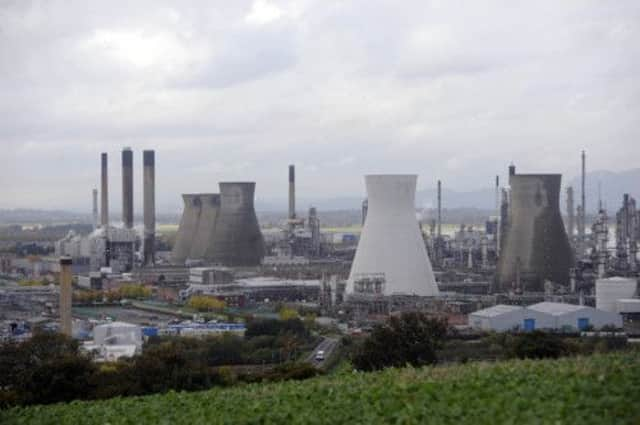Brian Monteith: Time to join world of international strategy


It was a sorry affair because so many people were given nights of despair following the shut down of the plant during the dispute, wondering what future they and their families faced – and then worse still were utterly distraught when Ineos announced that the petrochemical plant would actually close.
It was unnecessary because the evidence that the plant was genuinely in trouble was all there out in the open, so what had Unite officials living off the union dues of their members been doing to justify their existence?
Advertisement
Hide AdAdvertisement
Hide AdMost surprising to me was how only the media appeared to consider asking Edinburgh’s own world-class oil and gas analysts at Wood Mackenzie who, with only a phone call, could have told Unite or any politician of the economic realities needing to be faced.
The economics for Grangemouth continuing as it was did not stack up – why else would the owner’s own plans for investment centre around the need to bring in cheap fracked ethylene all the way from the United States? That such feedstuff for the plant could be sourced and shipped all the way from a nation on the other side of the Atlantic where labour costs are not especially low and still be preferable to Scotland’s own gas reserves revealed how all European petrochemical plants have been priced out of world markets. Petrochemical plants are being closed in Europe – including in England – or re-engineered to use fracked natural gas, so why should Grangemouth be so different?
It is easy to say the union overplayed its hand, but it was a bigger error than that, it was a complete misjudgment for it acted as if it was in a local poker match limited to Scotland – when the owner with a world view was actually playing chess. Fortunately Jim Ratcliffe’s call of “mate” shocked the unions into their senses and the recognition that there was nothing that would keep the plant open other than his new investment matched by them accepting new terms of employment.
What happened at Grangemouth then was an international event with repercussions for the future of Scotland’s economic reputation that go far beyond the politics of Westminster or Holyrood – or the independence referendum.
That there remains in the age of instant information such a complete disconnect by so many politicians and trades unions from the obvious global economic realities is both astounding and hypocritical. Nor is it a nationalist grievance to be nursed as if Scotland is being hard done by – tell that to the refineries and petrochemical plants in Ellesmere and Pembroke that have also been facing similar threats of closure.
In the business, economic and environmental context the importance of fracking as a source of low cost gas has to be much better appreciated and its introduction in Scotland cannot come quickly enough. It is deeply ironic that ethylene provided by fracking in the United States can be accepted by so many socialist, environmental and leftist politicians and commentators when the idea of allowing such a process to happen in Britain is vehemently opposed by those same voices. More ironic still is that instead of shipping the feedstuff across the Atlantic, the Grangemouth plant is as good as sitting on its own West Lothian source but for the fact that the comrades and tree-huggers continue to oppose any extraction.
We need fracking to progress in Scotland but what is Alex Salmond doing to make that possible, what is Johann Lamont doing to press him? Silence from the government (if not outright opposition) remains the position until after the independence referendum lest it falls out with the Green lobby and scares the voters. Likewise, Labour and the Liberal Democrats are reluctant to force the issue.
And yet allowing the use of fracking could help change not only our industries’ costs but our energy policies too – far more importantly than Miliband’s 20-month price freeze or Major’s absurd windfall profits tax. It is not uncommon for anti free-market critics to allege short termism by speculators rather than them adopting strategic solutions and yet price freezes and higher taxes are purely cosmetic and nothing other than short term fixes that store up more trouble. Making investments worth billions into fracking and, as at Grangemouth, hundreds of millions into port facilities to receive the products, are strategic decisions, they are long term, offering – it is argued – a 25-year future to the plant.
Advertisement
Hide AdAdvertisement
Hide AdIn the political context the continuing lazy default belief of Unite’s supporters that state ownership could and would solve everything ignores those world economic factors. The deal on the table at Grangemouth would have had to have been no different – no matter who owned the plant – otherwise anything it produced would have been overpriced and unwanted.
The majority shareholder, Jim Ratcliffe, has taken much criticism for playing hardball, with many suggesting no one man should have such Damoclesian power over so many livelihoods. On the contrary, thank goodness there was a Jim Ratcliffe willing to put together a plan and make the personal commitment where governments fear to tread and other companies will not take the risk. Scotland needs more investors such as the Mancunian Ratcliffe to see the opportunities for investment and put their faith in our workers.
Believing Scotland can resist such international economic forces – in a way that England cannot – has to change, whether we choose independence or stay in the Union.